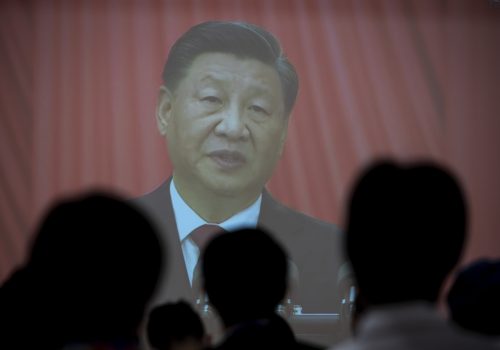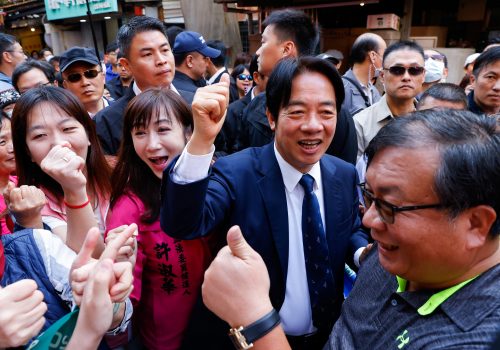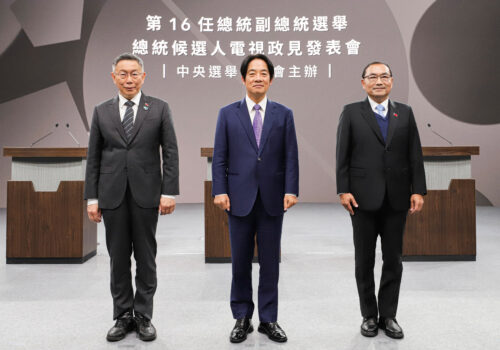Xi’s biggest problem isn’t Taiwan
This piece was updated on January 13 to reflect the results of Taiwan’s elections.
On the flight to Davos, my thoughts turned to Taiwan’s elections, which took place on January 13. As these elections approached, many wrote about Chinese leader Xi Jinping’s growing threats to Taiwan’s vibrant, free-market democracy. But I had been struck by how these elections have exposed Xi’s greater concern: authoritarian failure at home.
If Chinese Communist Party leadership was working, Xi would have had a more benign view of Taiwan’s elections, shrugging his shoulders at the race rather than his government calling it “a choice between war and peace.”
What goes unsaid is that China faces some of the lowest growth and highest youth unemployment since Xi took over as paramount leader in 2012. At the same time, Xi is purging the People’s Liberation Army, ostensibly over corruption but always about control. Just as China’s economy is sputtering, Taiwan—through semiconductor manufacturing and beyond—is now a global economic power player.
Xi has made the purpose of his leadership that of national revival, which was at the core of his New Year’s speech. The harder that looks to achieve at home, the more tempting it may become to force Taiwan, with its population of about 24 million people, into China’s embrace, with its population of 1.4 billion.
Despite the risks, Xi may lose patience with the failed conviction that China’s economic miracle over time would be the irresistible force for Taiwan’s unification. The Wall Street Journal’s Lingling Wei, in a compelling slideshow previewing the election, argues that Beijing’s rising pressure on Taiwan “indicates its strong desire to change the status quo—even as polls on the island say that the status quo is exactly what people there desire.”
Beijing has made no secret of its opposition to the election’s winner, the physician Lai Ching-te, also known as William Lai. He’s the current vice president, representing the independence-minded Democratic Progressive Party (DPP), but his smart approach is that Taiwan’s de facto independence requires no further declaration. A son of a coalminer, who died when he was little, he has a master’s degree in public health from Harvard and a passion for the disadvantaged.
But regardless of who is Taiwan’s president, writes Lingling Wei, “the uneasy coexistence between China and Taiwan for more than seven decades is likely to get more unstable in the months and years to come.”
That’s because the danger to Xi isn’t Taiwan but himself. Taiwan’s free vote that took place this weekend is an uncomfortable reminder that Xi will never enjoy democratic legitimacy. His legacy thus rests on delivering greater prosperity (increasingly difficult) or on whether he achieves—or fosters a perception that he achieved—a forced unification (heaven forbid).
Xi’s destructive policies at home—choking the private sector and silencing free speech—and his evisceration of Hong Kong’s autonomy have taught the Taiwanese that any form of unification would end their democratic freedoms.
One thing is certain as I approach the World Economic Forum in Davos. Taiwan’s status will remain the primary flashpoint in US-China relations, and one of the greatest global risks, for the foreseeable future.
Frederick Kempe is president and chief executive officer of the Atlantic Council. You can follow him on Twitter: @FredKempe.
This edition is part of Frederick Kempe’s Inflection Points Today newsletter, a column of quick-hit insights on a world in transition. To receive this newsletter throughout the week, sign up here.
Further reading
Thu, Jan 4, 2024
Xi Jinping’s real New Year’s message
Inflection Points Today By Frederick Kempe
Xi Jinping's New Year's message was more about vulnerability than strength.
Tue, Dec 19, 2023
What to know about China’s meddling in Taiwan’s upcoming election
New Atlanticist By Lev Nachman, Wen-Ti Sung
China's approach to spreading misinformation to influence Taiwan's upcoming elections has become more subtle and, perhaps, more effective.
Wed, Jan 3, 2024
Why Beijing’s latest pre-election attempt to coerce Taiwanese voters could backfire
New Atlanticist By Lev Nachman, Wen-Ti Sung
China recently said that it would end preferential tariff terms for some Taiwanese chemical exports. But the move may drive some Taiwanese voters away from the direction Beijing wants.
Image: People watch a giant screen broadcasting Chinese President Xi Jinping's speech at a celebration marking the 100th founding anniversary of the Communist Party of China in Shanghai on July 1, 2021. Photo via REUTERS/Aly Song.


